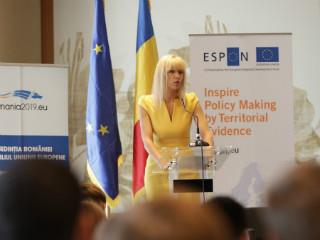Places in decline, are not left behind, they are kept behind, by decades of neglect, under-development, lack of investment and misguided policies said Professor Simin Davoudi, from the University of Newcastle, keynote speaker in the ESPON seminar about “the role of functional areas in territorial cohesion”.
The seminar was organised by ESPON EGTC and the Romanian Presidency of the EU in Iasi 19-20 June and focused on the need to design development policies for the needs of the people, beyond the restrictions of administrative borders.
Professor Davoudi urged policymakers to “re-focus territorial policies away from blanket approaches and formulas that are based on the transfer of money and aim to deliver GDP growth”. “The new focus said Ms Davoudi, “should be towards more tailor-made, locally led and place sensitive approaches that aim at improving quality of places and peoples’ lives”.
“Designing for borderless areas creates new grounds for cooperation at all levels, bringing people and places closer together to find joint solutions for their well-being,” said Mrs Ilona Raugze, director of ESPON EGTC, describing functional areas.
“This is a revolutionary approach,” said Ms Raugze, “that requires political leadership and a change in the mentality of policymakers, administration, and citizens to think and act beyond the restrictions of the administrative borders”.
“Policies for functional areas fail due to lack of political commitment” underlined the director of Research at The Business of Cities, Tim Moonen, also keynote speaker of the seminar. Other factors might be “the lack of willingness and culture of participation, and limited awareness of the potential for more efficient pooling of financial resources”.
Mr Moonen presented different types of mega-regions, multi-city regions and metropolis from Japan, Australia, China, USA and Germany. “There is not one model and one approach,” he said. “Functional integration is happening at different scales: mega-regions, multi-city regions, metropolis, but also in networks of secondary cities, corridors and rural areas”.
During the seminar, different ESPON projects provided insights from the latest ESPON evidence on topics related to the territorial cohesion debate including financial instruments, green infrastructure, circular economy, refugee flows, youth unemployment, geographical specificities, cultural heritage, territorial impact assessment, land-sea interactions, big data and urban-rural linkages.
Regarding the linkage between functional areas and areas in decline, a number of ESPON projects highlighted the potential big data and newly developed indicators have to support policymakers and researchers to better understand the needs and trends in their areas and adjust their policies accordingly.
Projects also pointed at the importance of guidance for rural areas to optimise the use of existing infrastructure, as e-services can only provide a limited replacement for in-person health and education provision. And they underlined the options of innovative strategies to attract diaspora back to their home regions with policies that can also include incentives.
*First published in espon.eu




 By: N. Peter Kramer
By: N. Peter Kramer
